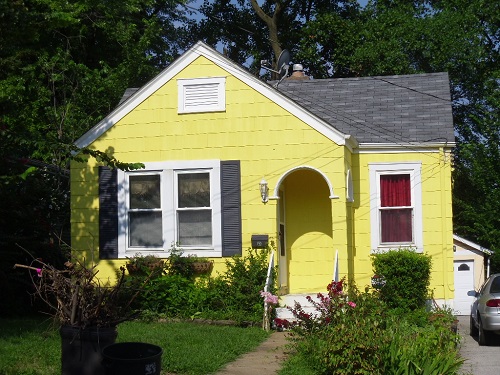| Back to Back Issues Page |
 |
|
Your February Useful Community Plus February 23, 2023 |
This month: Can Short-Term Rentals Be Too Much of a Good Thing?
Visit us at the Useful Community Development Website. Too Many Short-Term Rentals?How many short-term rentals make the neighborhood go downhill? We've been hearing that question in many different forms this year. For example, is it OK with you if all of the units in this building become short-term rentals? (As they say in school, why or why not?) 
How about this sunny little charmer? If you are a neighbor, do you care if this is listed on a popular short-term rental platform? Do you have a different opinion if it's the third one on your block?
Now what about that mansion of bygone days below? What if using it as a short-term rental is the only way that a buyer will take on this maintenance challenge in a historic district that outlaws window replacement?
These aren't the only challenges. Yesterday I attended a meeting of community development professionals in my home city. A discussion in the context of housing affordability wandered to the topic of a specific neighborhood being overrun with short-term rentals. The conversation came into sharp focus when a friend said she recently discovered that two-thirds of the rental housing in her neighborhood was owned by a couple of out-of-town investment companies, which had promptly placed the properties on a short-term rental platform. The result is that permanent residents are being priced out of the rental market, and rental housing at any price is in short supply. We say that when this happens, those with the least ability to pay and the lowest capacity for navigating the housing market will wind up unhoused. So in neighborhoods with proximity to tourist attractions, great scenery, a lively party scene, or just a lovely walkable neighborhood, keeping housing for locals must become a priority. We offer some basic tactics for dealing with this problem, which is becoming more and more common. 1. You could prohibit short-term rentals in certain zoning districts. Well, OK, my municipality didn't want to do that, because some older residents said they need the income to stay in their homes and some young homeowners needed to offset some of their mortgage payment. But it is an option that you can consider if you have a solid, planning-related rationale for where you deploy this strategy. 2. You can require that short-term rentals are a permissible land use only in the case of a resident property owner on the same premises, or perhaps within the block or a particular radius. This will limit the number of short-term rentals and also tend to tamp down the partying because property owners won't want to incur the wrath of their own neighbors. 3. You could talk with your city attorney about the older technique often applied to bars, in which a certain distance between them is required. 4. You can and should require a conditional use permit for each short-term rental unit or building. On an older page of our website, written originally before the advent of these very short-term rentals that we see now, we list some possible conditions. Even though that page was written with an eye toward situations such as the month-long rental in the Upper Peninsula of Michigan or in Florida, some combination of these requirements for conditional use could be a starting point for your local conversation about mitigating negative impacts of too many AirBnB's in your neighborhood. See the short- term rental zoning page for specifics. 
Here's a federal grant opportunity for non-profit community organizations. Projects must address either environmental or public health issues in communities that disproportionately contain environmentally harmful land uses or conditions. Collaborations with local businesses, medical organizations, colleges and universities, and local governments are allowed and encouraged. Grants are for either $150,000 or $500,000. For information on these Environmental Protection Agency grants, which you must apply for by April 10, see the online directions. The Aspen Institute's Community Strategies Group has launched a very good resource for rural communities called the Thrive Rural Framework. That page might start out a little wonky for many rural people, but stick with it, because there are some great charts and resources further down. We noticed a helpful article on how landlords can take an active role in preventing evictions. You might send this to all the landlords in your community, since evictions cause human misery, community disruptions, and in the worst case, homelessness. If you are in an older city that has suffered some decline, this important story about wrangling over development of historic properties is for you. Lastly, if you are concerned about how to deal with strong differences, such as those we are experiencing in the USA right now, please check out these brief but engaging videos that could be used in social media or email blasts. Although centered on the national conversation, a local neighborhood association has used two of these as brief polished introductions of "why" facing differences constructively is important.
As usual, we have answered some questions from our website visitors this month. See if one of these is of interest to you. When should a new CDC should file for a 501c3 designation? Can the code enforcement officer decide what is trash and what isn't? How long will a new rural CDC need foundation grants for operations? At the other end of the spectrum there was a question to the effect of whether a CDC can be national in its reach. What about truck parking at a residence? Is Code Enforcement required to translate violations? How about a translator in municipal court?
Feel free to reply with comments. To ask a question, use that public-facing community development questions page on the website. Our next issue will appear on a Thursday in March. |
| Back to Back Issues Page |


